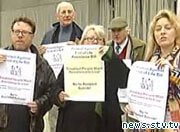Disability campaigners have warned that a controversial bill which would legalise assisted suicide in Scotland discriminates against disabled people.
Watch a news report of the protest
Margo MacDonald’s End of Life Assistance (Scotland) Bill would allow the terminally ill and the physically incapacitated to seek assistance in ending their lives.
Earlier this week members of Inclusion Scotland, a group which campaigns on behalf of disabled people, held a protest outside Holyrood as a special committee met to scrutinise the Bill.
Live
Protester Catherine Garrod, a disability support worker, said: “I think it is offering assisted suicide to disabled people but a non-disabled person who was suicidal would be given counselling.”
And Dr Colin Cameron, a disability equality trainer, said: “We need to provide support for disabled people to live on their own terms, not providing support for them to die.”
These sentiments were echoed by a number of groups who gave evidence before MSPs on Tuesday.
Responsibility
Pam Duncan, a board member of Inclusion Scotland, cautioned: “I genuinely believe that as a parliament we have a responsibility to make life a better choice than death.”
And John Deighan, parliamentary officer for the Roman Catholic Bishops Conference of Scotland, cautioned that legalising assisted suicide would lead to it becoming increasingly prevalent in society.
He said: “It has widened in the Netherlands, we’ve seen it go from terminally ill to chronically ill, to people who are competent to people who are incompetent, to children, so safeguards simply will not work.”
Disabled
However Margo MacDonald, the independent MSP responsible for the Bill, dismissed the protest, saying: “The Bill has nothing whatsoever to do with disabled people, and I think it is absolutely disgraceful that such vulnerable people should have been used here today.”
Earlier this month Mrs MacDonald indicated that she was prepared to drop the disability clause from the bill.
Sarah Wootton, chief executive of the pro-euthanasia campaign group Dignity in Dying, told MSPs that the Bill would simply regulate a practice which already exists.
She said: “This is going on anyway, there is no doubt about that, there is voluntary euthanasia and non-voluntary euthanasia in every country of the world.”
Illegal
Assisted suicide is currently illegal in Scotland and anyone involved in assisting suicide may be charged with culpable homicide.
Last week Dr Tony Calland, Chair of the BMA’s Medical Ethics Committee warned against the Bill.
He cautioned: “Once you’ve crossed the rubicon of changing the law to allow premeditated hastening of the death of another person, you can never go back.”
Dr Calland also said that if legislation allowing assisted suicide was passed it would inevitably “creep” into other areas.
Groundswell
Earlier this month Elaine Stevens, from the Independent Association of Nurses in Palliative Care, asked: “Does Scotland really want to be recognised as a ‘death tourism’ destination?”
She also warned that people would register with doctors who took part in the scheme, even if they didn’t live in the area.
In June over 14,000 people signed a Care not Killing petition against the Bill.

